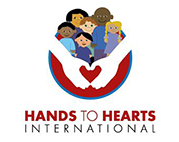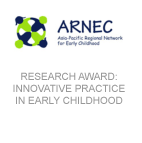OUR TRAINING
About HHI’s Training
HHI Trainers are women and men, who are respected local leaders in their own communities, fluent in their own culture and committed to service. They come with a basic knowledge of early childhood development (ECD) and they have learned how to apply HHI’s training within their communities, using their own culture’s stories, games, songs, and dance. They are able to engage and empower a wide variety of caregivers, while also including their children in the training to make the lessons meaningful, practical and fun. Each training is action-packed and every trainee learns about the child they care most about – their own!
Sign up to Download Curriculum for FREE!
– available in Bengali, Creole, English, and Hindi
Key Lessons:
Know Your Baby’s Brain The first years of life offer the fastest and most critical time of brain development, setting the foundation for all future learning. Parents and caregivers are the most important early teachers, playing an important role in helping their baby develop to their full potential. Learn about the connections between the different areas of development, such as how holding a baby, while singing to her and looking in her eyes is promoting physical, cognitive, language and social and emotional development. Also discuss individual variations, and the importance of observation and play.
Baby Cues Babies are born communicating. Their facial expressions and body language are communicating messages all the time, but you have to slow down and observe. With practice caregivers can learn what their baby is communicating before they have the words to explain themselves, and in responding to these cues, caregivers build a deeper bond with their child, build their own confidence, and typically report feeling much more gentle and calm in their interactions.
Language Development This lesson is highly interactive! Story cards, puppet shows, songs, drama and stories are all used to engage caregivers and children alike and are resources caregivers already possess. Everyday interactions, talking to your child, telling stories, reading books and just pointing out different colors and naming items, all of these simple activities are building the child’s language development, even before the child can speak.
Social and Emotional Development Here adults learn that they are the most important person in their child’s life! Participants awaken their innate love, nurturing, and caring to build bonding and attachment. These qualities, along with consistent and responsive care create the basis of a child’s humanity, enabling them to become healthy, complete human beings and productive citizens of the world.
Physical Development Covers actual physical growth and details the evolution of fine and gross motor development. Links growth to good nutrition and health, and the importance of a child’s relationship to their parent/caregiver. Trainers lead a variety of games and point out how children of different ages can play and interact.
Developing the Thinking Pathways (Cognitive Development) Babies and children experience the world differently than adults, this section reveals both what a child knows, how they think, learn and make sense of their world. Empowers caregivers to support early learning and that their interactions make a big difference in brain development.
Baby Massage This is by far HHI’s most popular lesson! This is a hands-on, fun, relaxing set of lessons for both adults and children. It is a key tool in building attachment, it supports all areas of development and it has emotional benefits for all involved.
Health, Hygiene, Nutrition, and Sanitation In compromised environments, these lessons are of critical importance! Caregivers learn basic information and practices for immunizations, breastfeeding and nutrition for both mother and baby, hygiene, sanitation and safety, and toileting issues. Small behavior changes lead to major health benefits.
HHI’s lessons intertwine knowledge of age-appropriate child development with very specific caregiver actions, one rationalizing the other. This leads to many ah-ha moments, when caregivers understand a child’s differing needs and abilities as they grow through different ages.
Sign up to Download Curriculum for FREE!









